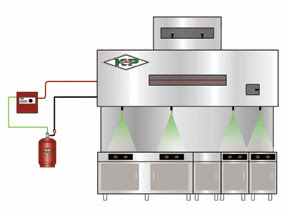Kitchen Fire Suppression System Installation in Pennsylvania
Commercial kitchens are busy environments where many fire hazards exist. From multiple burners to flammable liquids to inattentive employees, there’s a lot that can encourage a fire event to break out in your commercial kitchen. That’s why it’s important for Central Pennsylvania restauranteurs to invest in a robust commercial kitchen fire suppression system to stay protected in case of an emergency.
Liberty Fire Solutions has more than 40 years of experience installing the safest fire suppression systems in the industry. Our team understands the many factors that can contribute to a commercial kitchen fire event, allowing us to engineer the perfect fire safety solutions for restaurant environments.
Current Regulations for Commercial Kitchen Fire Suppression Systems
The United States has three main standards in place to ensure safety in commercial kitchens across the nation, including:
- UL 300: Standard for Fire Testing of Fire Extinguishing Systems for Protection of Commercial Cooking Equipment
- NFPA 17A: Standard for Wet Chemical Extinguishing Systems
- NFPA 96: Standard for Ventilation Control & Fire Protection of Commercial Cooking Operations
Commercial kitchens are hotbeds for potential fire hazards, which is why strict regulations are in place to ensure fire suppression systems are properly equipped to contain a kitchen fire event. Specifically, commercial kitchen fire suppression systems must be installed in hoods, ducts, and over individual pieces of cooking equipment. A manual pull station for fire suppression system activation should also be placed inside the kitchen, and the suppression system should feature an automatic shut-off for all cooking appliances when a fire event is detected.
Because commercial kitchen fires typically deal with flammable liquids, it’s important for suppression systems to be equipped with a wet chemical agent specially designed to suppress flames. Liberty Fire Solutions offers the commercial kitchen fire suppression systems necessary for maintaining code compliance with UL 300, NFPA 17A, and NFPA 96 mandates. Contact our team today to schedule commercial kitchen fire suppression system installation services in your Central Pennsylvania restaurant!
Commercial Kitchen Fire Suppression Systems in Central Pennsylvania
At Liberty Fire Solutions, our team has spent years installing the finest fire suppression systems available for commercial kitchen applications. Our systems are designed to detect a fire event and deploy the necessary wet chemical agent for quickly suppressing flames and preventing further damage. Engineered to quickly and efficiently deprive flames of oxygen, our commercial kitchen fire suppression systems are tailored to Class K fire events involving cooking oils, fats, and flammable liquids.
Once your system is activated, it will immediately cut off the power from cooking appliances, and gas will be shut down to further deprive the fire of fuel. This sophisticated approach reduces damages incurred from a fire event and allows normal kitchen operations to resume quickly. Get the commercial-grade protection you need to survive a fire event by scheduling kitchen fire suppression system installation services with our team today!
Call Us for Your Kitchen Fire Suppression System Installation Needs
Keeping your commercial kitchen safe from harm is our top priority. Featuring the most advanced fire safety technology by a team of fire safety technicians, there’s no better solution for your commercial kitchen fire suppression needs than Liberty Fire Solutions. Contact our team today to schedule installation services for your Central Pennsylvania commercial kitchen fire suppression system.
Frequently Asked Questions
How often should a kitchen system be inspected?
A kitchen hood suppression system should be inspected by an appropriate professional at least once every six months according to most manufacturer recommendations, the UL 300 standard for testing, the NFPA 17A standard for wet chemical extinguishing systems, and the NFPA 96 standard for commercial cooking fire protection. You might want to schedule an inspection earlier if you’re worried about a problem, or you might need one more frequently according to some other standard, such as insurance requirements or local regulations.
Besides a kitchen system, what can I do to prevent fires?
Preventing kitchen fires comes down to simple organization and caution. Keep your kitchen clean, keep it orderly, keep flammable materials such as paper and aerosol compounds far away from all heat sources, and make sure grease and oil aren’t left unattended. While it’s almost impossible to never have a flare-up in your kitchen, you can greatly reduce the risk of anything actually catching aflame and becoming a danger. Of the threats that develop into commercial kitchen fires, grease accumulation should be your biggest concern; not only is it the leading cause of commercial kitchen fires, it’s harder to put out than fires from paper or other substances.
How does a kitchen fire suppression system work?
As with most fire suppression systems, the idea is to react to the presence of a fire and extinguish it automatically, faster than a human could and without the risk of anyone being trapped or unable to intervene. More specifically, a kitchen fire suppression system has small fusible links that exist to keep the system from activating; these are susceptible to melting in the heat of a fire. Once they’re gone, nozzles over the target surface release a suppressant to smother the fire. The system will also cut off the electricity and gas to the unit for added safety.

